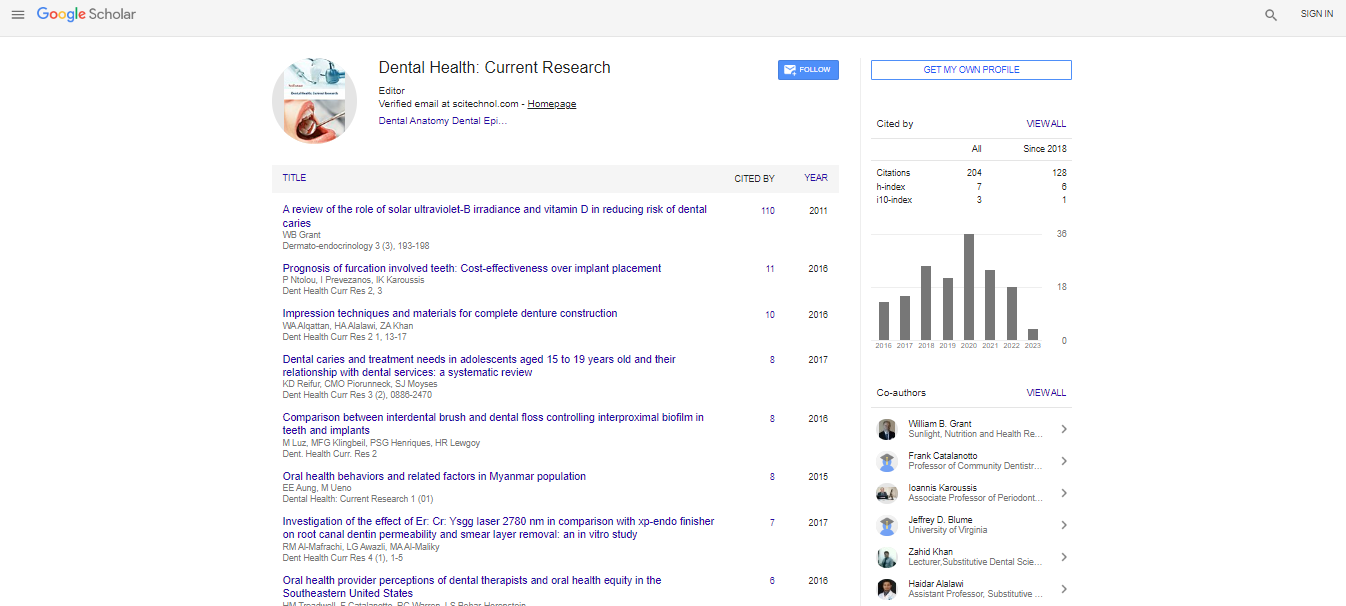Commentary, Dent Health Curr Res Vol: 10 Issue: 4
Periodontics Explained: Essential Care for Healthy Gums and Teeth
Harvard Smith*
1Department of Periodontics, The University of Texas Health Science Center at San Antonio, Texas, United States of America
*Corresponding Author: Harvard Smith,
Department of Periodontics, The
University of Texas Health Science Center at San Antonio, Texas, United States of
America
E-mail: smith.098@uni.edu
Received date: 22 July, 2024, Manuscript No. DHCR-24-147379;
Editor assigned date: 24 July, 2024, PreQC No. DHCR-24-147379 (PQ);
Reviewed date: 07 August, 2024, QC No. DHCR-24-147379;
Revised date: 14 August, 2024, Manuscript No. DHCR-24-147379 (R);
Published date: 21 August, 2024, DOI: 10.4172/2470-0886.1000224
Citation: Smith H (2024) Periodontics Explained: Essential Care for Healthy Gums and Teeth. Dent Health Curr Res 10:4.
Abstract
Description
Periodontics is a specialized field of dentistry that focuses on the prevention, diagnosis and treatment of periodontal disease, also known as gum disease. Periodontists are dental professionals who specialize in maintaining the health of the structures that support the teeth, including the gums, bones and ligaments. Periodontal health is important for overall oral health, as untreated gum disease can lead to tooth loss and other serious health issues. Here one can explore what periodontics entails, the causes and stages of periodontal disease and how it can be prevented and treated.
The main cause of periodontal disease is the buildup of plaque, a sticky film of bacteria that forms on the teeth. If plaque is not removed through regular brushing and flossing, it hardens into tartar, which can only be removed by a dental professional. Over time, the bacteria in plaque and tartar can cause the gums to become inflamed and pull away from the teeth, forming pockets where more bacteria can accumulate. Inadequate brushing and flossing allow plaque and tartar to build up, leading to gum disease. Tobacco use is a major risk factor for periodontal disease. Smokers are more likely to develop gum disease and it often progresses more rapidly in smokers. Some people are genetically predisposed to gum disease, making them more susceptible even with good oral hygiene. Changes in hormones, such as during pregnancy or menopause, can increase the risk of gum inflammation and periodontal disease. Certain health conditions, such as diabetes and heart disease, have been linked to an increased risk of periodontal disease. Some medications can affect oral health by reducing saliva production or causing gum overgrowth, which makes it easier for plaque to build up.
Gingivitis is the earliest stage of periodontal disease and is characterized by red, swollen gums that may bleed when brushing or flossing. At this stage, the condition is reversible with proper oral hygiene and professional cleaning, as the damage has not yet spread to the bone. If gingivitis is left untreated, it can advance to mild periodontitis. At this stage, the inflammation begins to affect the bone that supports the teeth. The gums may start to recede and small pockets can form between the teeth and gums, trapping more bacteria. Mild periodontitis is treatable, but the damage to the bone is permanent. In, the more advanced stages, the pockets deepen and the infection can destroy more bone and connective tissue, leading to loose teeth. At this point, tooth loss becomes a real risk. Without treatment, severe periodontitis can result in significant damage to the teeth, gums and jawbone.
Preventing periodontal disease starts with maintaining good oral hygiene and making regular visits to the dentist. Brushing at least twice a day and flossing daily helps remove plaque before it hardens into tartar. Make sure to use a soft-bristled toothbrush and fluoride toothpaste for the best results. Regular dental cleanings and check-ups are needed for preventing gum disease. Your dentist or dental hygienist can remove tartar and monitor your gum health to catch any early signs of trouble. Smoking is a major contributor to periodontal disease. Quitting smoking not only improves gum health but also reduces the risk of many other health problems. A balanced diet rich in vitamins and minerals, particularly vitamin C, helps promote gum health and boosts your immune system’s ability to fight off infections. If you have a medical condition such as diabetes that increases your risk of periodontal disease, it’s important to work with both your dentist and doctor to manage the condition effectively.
Conclusion
Periodontics plays a vital role in maintaining the health of your gums and teeth, especially in preventing and treating periodontal disease. Gum disease is a common but preventable condition that can have serious consequences if left untreated. By practicing good oral hygiene, making regular visits to the dentist and seeking treatment early when signs of gum disease appear, you can protect your oral health and avoid the more severe stages of periodontal disease. For those who do develop more advanced gum disease, periodontists provide a range of treatments to restore oral health and prevent further complications.
 Spanish
Spanish  Chinese
Chinese  Russian
Russian  German
German  French
French  Japanese
Japanese  Portuguese
Portuguese  Hindi
Hindi 